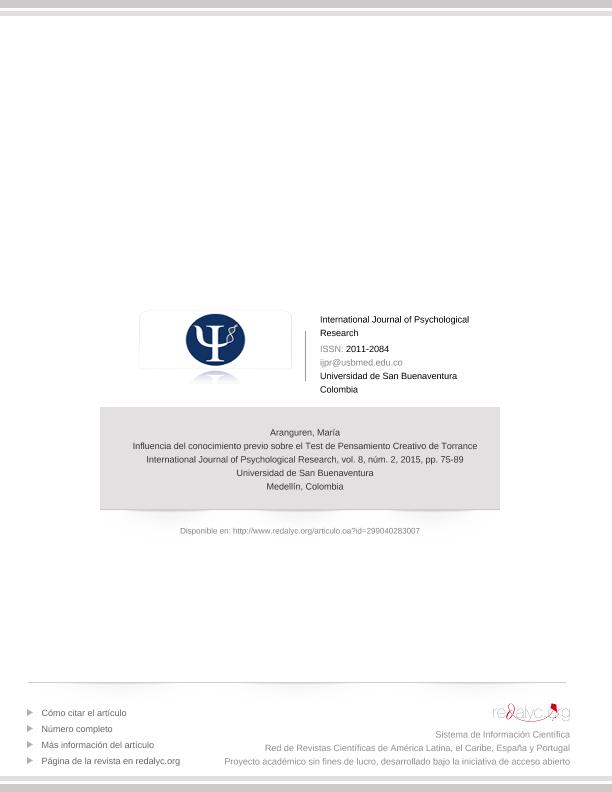Mostrar el registro sencillo del ítem
dc.contributor.author
Aranguren, María

dc.date.available
2020-08-11T17:56:24Z
dc.date.issued
2015-05
dc.identifier.citation
Aranguren, María; Influencia del conocimiento previo sobre el Test de Pensamiento Creativo de Torrance; Universidad de San Buenaventura. Facultad de Psicología; International Journal of Psychological Research; 8; 2; 5-2015; 75-89
dc.identifier.issn
2011-2084
dc.identifier.uri
http://hdl.handle.net/11336/111433
dc.description.abstract
Este estudio analiza la influencia del área de estudio, la experticia y la participación en actividades recreativas sobre el Test de Pensamiento Creativo de Torrance (TTCT, 1974). Las hipótesis de trabajo se orientan a indagar la influencia del conocimiento previo sobre el rendimiento de los estudiantes en el TTCT de figuras y verbal. Participaron 418 estudiantes pertenecientes a cinco áreas de estudios: Psicología, Filosofía y Letras, Música, Ingeniería y; Ciencias de la Comunicación. Los resultados parecen indicar que no hay una influencia del área de estudio ni de la experticia sobre las puntuaciones del TTCT verbal y de figuras. En cambio, sugieren cierta interacción entre las habilidades requeridas para capacitarse en determinadas áreas y el rendimiento en pruebas como el TTCT. Estos hallazgos implican que el TTCT es un instrumento válido para evaluar la creatividad y que algunos de los procesos cognitivos involucrados en el pensamiento innovador pueden ser estimulados a través de programas de intervención escolar y/o universitaria independientemente del área de estudio de los alumnos.
dc.description.abstract
The aim of this work is to analyze the influence of study field, expertise and recreational activities participation in Torrance Tests of Creative Thinking (TTCT, 1974) performance. Several hypotheses were postulated to explore the possible effects of previous knowledge in TTCT verbal and TTCT figural university students’ outcomes. Participants in this study included 418 students from five study fields: Psychology; Philosophy and Literature, Music; Engineering; and Journalism and Advertising (Communication Sciences). Results found in this research seem to indicate that there in none influence of the study field, expertise and recreational activities participation in neither of the TTCT tests. Instead, the findings seem to suggest some kind of interaction between certain skills needed to succeed in specific studies fields and performance on creativity tests, such as the TTCT. These results imply that TTCT is a useful and valid instrument to measure creativity and that some cognitive process involved in innovative thinking can be promoted using different intervention programs in schools and universities regardless the students study field.
dc.format
application/pdf
dc.language.iso
spa
dc.publisher
Universidad de San Buenaventura. Facultad de Psicología
dc.rights
info:eu-repo/semantics/openAccess
dc.rights.uri
https://creativecommons.org/licenses/by-nc-sa/2.5/ar/
dc.subject
AREA DE ESTUDIO
dc.subject
EXPERTICIA
dc.subject
TTCT
dc.subject
CREATIVIDAD
dc.subject.classification
Otras Psicología

dc.subject.classification
Psicología

dc.subject.classification
CIENCIAS SOCIALES

dc.title
Influencia del conocimiento previo sobre el Test de Pensamiento Creativo de Torrance
dc.title
Influence of Previous Knowledge in Torrance Tests of Creative Thinking
dc.type
info:eu-repo/semantics/article
dc.type
info:ar-repo/semantics/artículo
dc.type
info:eu-repo/semantics/publishedVersion
dc.date.updated
2020-08-11T15:30:15Z
dc.journal.volume
8
dc.journal.number
2
dc.journal.pagination
75-89
dc.journal.pais
Colombia

dc.journal.ciudad
Medellín
dc.description.fil
Fil: Aranguren, María. Pontificia Universidad Católica Argentina "Santa María de los Buenos Aires". Facultad de Psicología y Psicopedagogía. Centro de Investigaciones en Psicología y Psicopedagogía; Argentina. Consejo Nacional de Investigaciones Científicas y Técnicas; Argentina
dc.journal.title
International Journal of Psychological Research
dc.relation.alternativeid
info:eu-repo/semantics/altIdentifier/url/https://www.redalyc.org/articulo.oa?id=299040283007
dc.relation.alternativeid
info:eu-repo/semantics/altIdentifier/url/https://revistas.usb.edu.co/index.php/IJPR/article/view/1511
Archivos asociados
